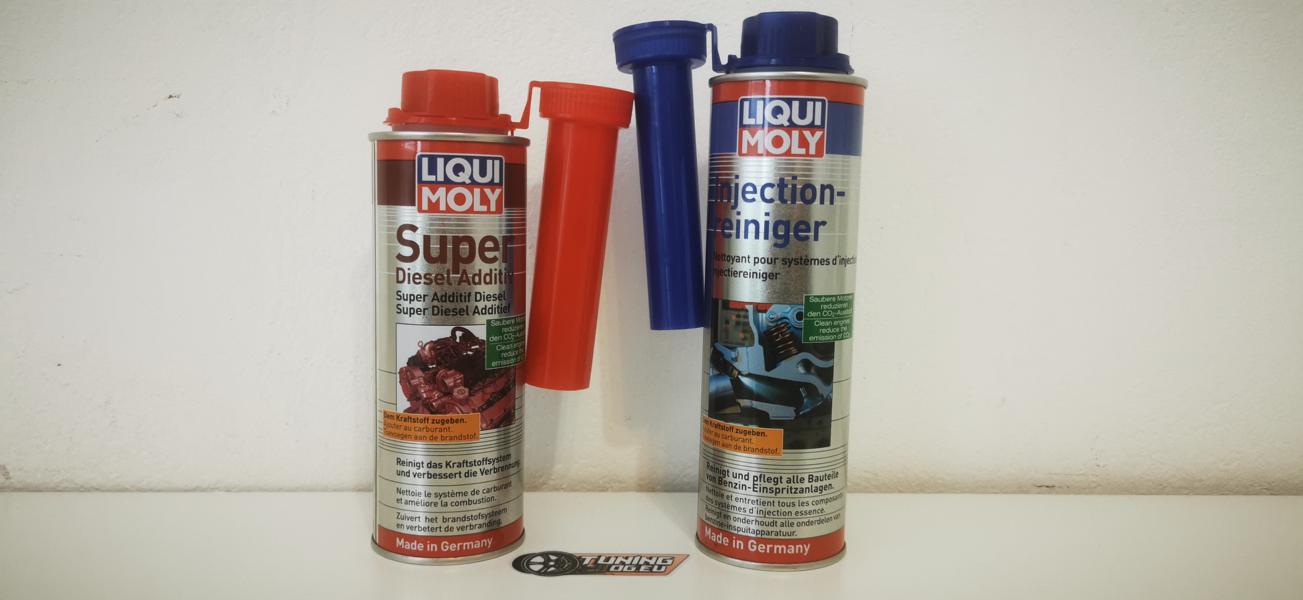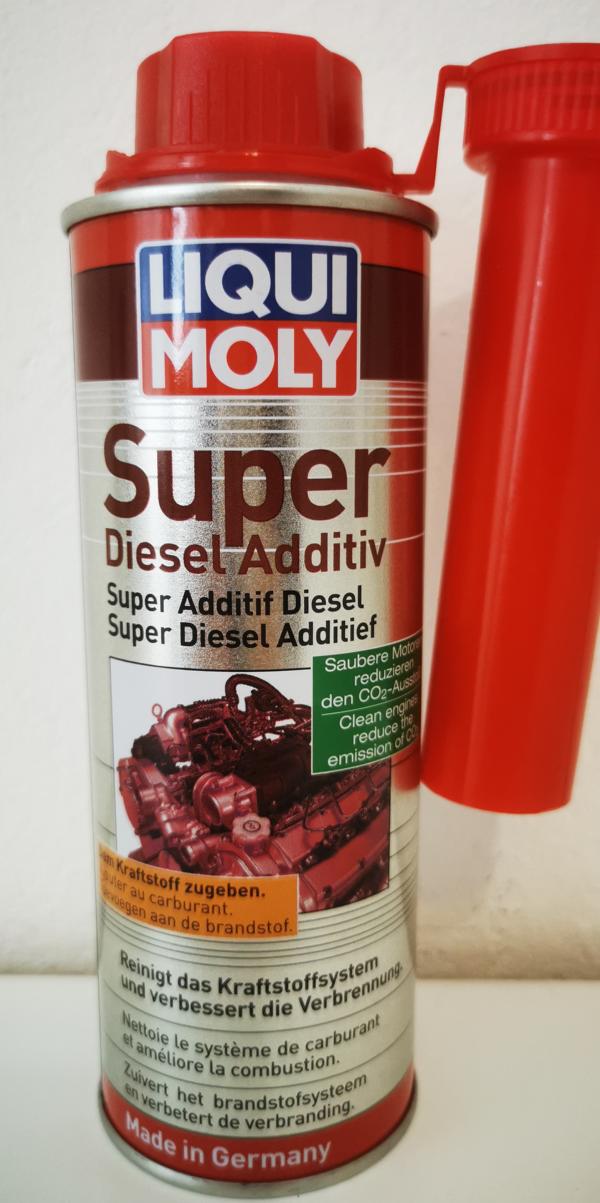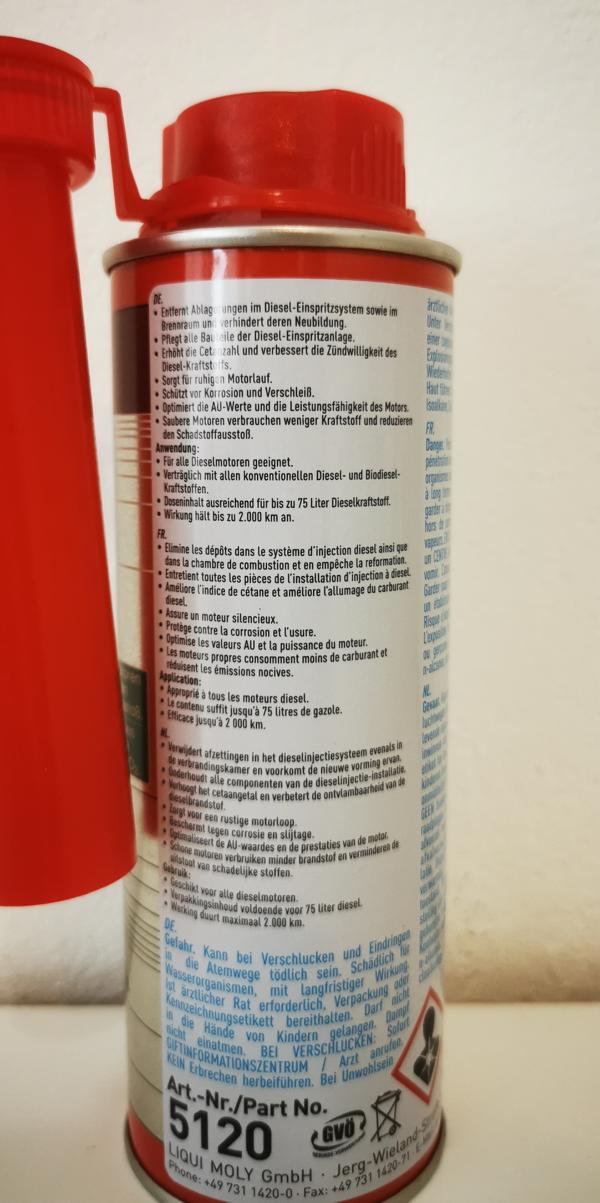After we are concerned with the contribution "Are Gasoline Additives Beneficial For Vehicle Engines?“Having dealt with the additives for gasoline engines, we would now like to address the issue with regard to the Diesel engine take up briefly. What are Diesel additives at all? As diesel additives are used in technical jargon additives denotes which are added to conventional diesel fuel in order to improve the combustion properties optimize and at the same time the engine save. If you use diesel additives more often, this can have positive effects on the entire fuel system of the vehicle. At least that's what the manufacturers do!
The following is an overview of the supposedly positive effects of diesel additives:
- Optimization or reduction of fuel consumption
- Deposits on valves and injectors can be removed
- better protection against corrosion
- reduced CO2 emissions from the vehicle
- optimized engine performance, including clean and ash-free combustion
- significantly better ignition readiness of the fuel
In short: According to the provider, diesel additives have many positive Effects. They protect the engine, keep it clean and optimize its performance. Diesel additives have a similar effect on the engine as vitamins on the human body. And the best comes for last: Due to the lower wear, you can too Repair costs save on. However, these are all information from the manufacturers and sellers of the additives.
Tests confirm the positive effects of diesel additives
Some car magazines and the ADAC have carried out various tests and came to the conclusion that the engines are already following 1-2 tank fillings with added additives Together and quiet walked. In addition, a reduced fuel consumption to be established. The additives allegedly reduced the average consumption per 100 kilometers by astonishing 0,5 liters. The use of additives could ultimately be profitable, or at least significantly, just through the fuel saved to reduce.
What about the use of additives in classic cars?
There are a number of additives, especially in classic cars positive impact. According to GTÜ, the exhaust gas values of the vintage cars are significantly improved by additives. For example, after driving an older diesel engine over a distance of approx. 600 km and a vehicle with a gasoline engine over a distance of approx. 450 km, none Carbon monoxide more to be measured. In addition, the Hydrocarbon concentration of diesel fuel by half. But how do the positive effects come about? It's easy to explain: the additives have one cleansing effect on the injectors of the vehicle, which is why the fuel can be atomized more finely again.
What additives does diesel contain?
In order to improve diesel fuel, numerous must additives are supplied, which subsequently lead to different chemical reactions. Certain modifiers that are added to the diesel produce highly flammable free radicals. This will make a better one Cetane number, so a better one Ignitability of the fuel. But there are also other substances used, which Sediments solve and deposits prevent. For example be Anti-wear fabrics for Improvement of the lubricating properties mixed with diesel, which also reduce engine wear. In winter the diesel fuel will still be used other additives admixed, which the fuel filter before a constipation protect. Hence the name "Winter diesel" conditions.
The following is an overview of the diesel additives:
- Modifiers - promote ignitability
- Chemical substances - dissolve the sediments
- Anti-wear substances - protect the engine
Can diesel additives also cause damage?
Diesel additives can be proven no damages cause on the engine. Damage is more likely if you don't additives in use an older vehicle and maybe still approve Fuel type refuel. Because without additives, not only the wear but also the consumption of the engine is significantly increased. Additives should therefore, especially with older vehicles and classic cars, be used. In newer cars they only have one preventive Effect, but in older vehicles, the use of additives is essential wichtig to ensure the smooth functioning of the engine.
How are additives used correctly?
You can find diesel additives in many online shops, these can be added to the diesel anytime be added. For a premium diesel, the additives should be in proportion to the fuel 1:5000 mix in. Do you want one Intensive cleaning perform is a mixing ratio of 1:1000 (Additive to fuel) required. This stronger dosage should only be used for maximum 3 tank fillings be applied.
Additives for the diesel particulate filter
How do additives work for diesel particulate Filter and why are they necessary? You should first know what a diesel particulate Filter (DPF) at all. This filters the soot out of the exhaust gases, causing it to stick to the filter wall over time deposits form. Although these are at a temperature of approximately 600 ° C automatically burned, but the temperature is only reached if you longer distances return. If you only drive short distances, the filter may become damaged do not clean independently and could clog. With a special additive for diesel particulate Filter will the Burning temperature to 300 ° C lowered and the filter can also be used in city traffic clean by itself.
Engine flushes and additives
Additional cleaning can be done with Engine flushing be achieved. The advantage of these measures is that they are considerably cheaper than one Repair are and the Fuel and Oil consumption positively influence. To flush the engine, the operating temperature Unit on Cleaning additive admitted. A bottle with 500 ml is sufficient to approx. 5 liters of engine oil to treat. The additive is well distributed in the engine if it runs at idle for several minutes after filling. In this way, the engine flush reaches all relevant engine parts such as the camshafts, piston rings and valve stems. The Detergents loosen the deposits in the bores, bearings and surfaces. The Dispersants envelop the particles and keep them in suspension. You cannot redeposition yourself. With the Change of engine oil the dissolved and bound particles then come out.
Cars with high mileage and a higher age are often only filled with simple / cheap engine oils. However, its lifespan is limited. In addition, are only few additives mixed in. The risk of deposits and metallic abrasion increases so. Here is one Engine flushing through a special additive recommendable. For owners of classic cars (petrol), the additives are a substitute for that Tetraethyl lead. At the time, this was added to the fuel to improve its anti-knock properties. But now it is forbidden.
Criticism of the engine flush
Modern vehicles run with effective engine oils from the factory. The high-performance oils have a certain amount of additives included. An engine flush is then actually unnecessary. But it doesn't really hurt either. Who is a flush from the engine save should buy high-quality motor oil. It doesn't get any more expensive in the end!
Our conclusion in terms of diesel additives
Many tests show one gutes Result: Diesel additives have a positive effect on the engine. Especially with older or old vehicles. They protect the environment through their low pollutant emissions and sometimes even help to save a few euros through reduced fuel consumption. Their cleaning effect protects the engine and extends its service life.
We hope that you have received our information report on the topic / term Diesel additives (Further designations / keywords are: Diesel additives, diesel engine system cleaner, engine flushing, diesel engine system cleaner, cleaning additive, fuel additive, fuel additive, diesel system cleaner, diesel system care, diesel injection system cleaner) from the Autotuning category. Our goal is to have the largest German-speaking tuning lexicon (Tuning Wikipedia) and to explain tuning technical terms from A to Z easily and understandably. We are therefore expanding this lexicon almost daily and you can see how far we have already come HERE see. And soon the next one will be Tuning scene concept illuminated by us. There's a theme that not can be found in our Wikipedia? Then send us an email at kontakt@tuningblog.eu and gives us the term. We will write a suitable article as soon as possible. PS. By the way, you will be informed about new topics if you have ours Feed subscriber.
Below are a few examples from our tuning lexicon:
But of course tuningblog has countless other articles on the subject of cars & car tuning in stock. Do you want to see them all? Just click HERE and look around. We would also like to provide you with news aside from the tuning. In our category Tips, products, information & Co we pick up contributions from car or accessory manufacturers. And also our category Test sites, laws, offenses, information has almost daily new information for you. Here are a few topics from our tuning wiki:
"Tuningblog.eu" - we keep you up to date on the subject of car tuning and car styling with our tuning magazine and we present you the latest tuned vehicles from all over the world every day. It's best to subscribe to ours Feed and will automatically be informed as soon as there is something new about this post, and of course also to all other contributions.
 tuningblog.eu Your magazine about tuning the car
tuningblog.eu Your magazine about tuning the car







